Bobby Warren knows something about the crime of homelessness.
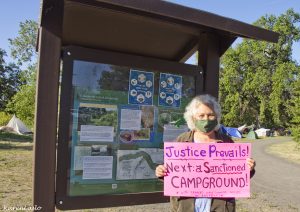
His court docket is a litany of supposed missteps, with various charges related to Chico ordinances. According to court records, he’s been caught in Depot Park when it was officially closed, stored belongings near a Chico creek, been cited for illegal camping — all examples of ways you might violate city code if you’re wandering unmoored, without an address, job or helpful relative.
Warren also must know something about misfortune: He lost his home after a divorce and cancer diagnosis. He has been fined around $2,000 for code violations, fines that came down after notices addressed to Warren were returned to the court (he sleeps outside!). The “Failure to Appear” entries mount up quickly, the docket shows.
A lawsuit filed in U.S. District Court by Legal Services of Northern California (LSNC) against the city and its Police Department points out that Chico’s “web of ordinances” has grown more punitive, with a City Council majority (newly-elected and more conservative) increasing penalties from administrative citations to criminal violations. The web ensnares unhoused people, according to LSNC, who have physical and mental disabilities, who survived the Camp Fire, who are struggling with trauma or illness.
Warren, one of eight unhoused plaintiffs, in an April 20 declaration filed with the Eastern District court, says he’s been cited six times. The docket shows the citations were related to his homeless status and handed out between 2018 and 2020.
Chico Police Sgt. Paul Ratto has also filed a declaration stating that none of the eight plaintiffs in the case were cited when the city ratcheted up enforcement around Jan. 12, although four other people were. But since 2018, the lawsuit says the city has issued 242 criminal and administrative citations for violations of the ordinances.
The law-and-order approach to homelessness, in general, is ineffective in reducing the numbers of unhoused people, say researchers and service providers across the nation. Chico doesn’t seem to be an exception.
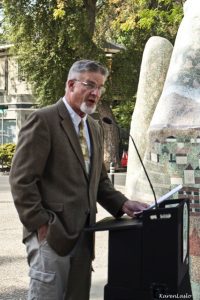
Scott Huber, a member of the liberal minority on the Chico City Council, said Tuesday the approach is also failing here; police sweeps have only “increased suffering and emotional trauma.” Huber said if the sweeps continue they’ll drive unhoused people deeper into parks and neighborhoods, creating “more community strife and problems.”
Community strife was on full display Tuesday as Huber spoke, ironically, at the Our Hands sculpture that symbolizes openness and inclusion. A press conference organized by Huber and Councilor Alex Brown outside the municipal building was interrupted by provocateurs; there was pushing and heckling, and in one case a Chico man said his eyeglasses were stomped on.
Chico’s harsh approach to homelessness has energized groups on all sides of the issue, increasing polarization; the city now seems at war with itself. On social media, unhoused people are blamed for their problems, often in vulgar and mean-spirited language. Increasingly, they’re targets of abuse in public.
In another April 20 declaration filed with the federal court, an unhoused woman says water bottles were thrown at the homeless and they were harassed by neighbors before being evicted from encampments at Boucher Street and the so-called Triangle.
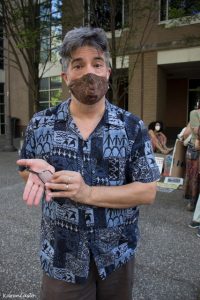
“To see our community behaving with such ugliness … it’s just devastating to see our community like this,” said Meghan Philippi, who attended the Tuesday press conference with her husband Edward to hear Huber and Brown speak.
Edward Philippi, a disaster relief worker, said he was pushed a couple of times by a man who was “looking for a fight.” Philippi pushed back, his eyeglasses fell to the ground and he said the man stretched out his leg and smashed his glasses. “I haven’t pushed anyone since junior high,” said a stunned Edward Philippi.
This reporter, while filming the press conference, was pushed aside by a man who then stepped in front to block our ability to film.
City stands its ground in lawsuit response
The lawsuit may take months or even years to resolve, but it has momentarily stopped the police sweeps that have pushed homeless Chico-area residents from parks, to creeksides, to median strips. In an 11th hour pleading filed April 11, LSNC won a temporary restraining order, signed later the same day by U.S. District Court Judge Morrison England, Jr. It came just one day before a planned sweep of an encampment at the Comanche Creek Greenway.
At Comanche Creek on the southwestern edge of town, there was a palpable sense of relief the next day when an LSNC attorney arrived to deliver the news that a judge had stopped enforcement of the eviction notices.

“This is as far back as you can push us,” said 45-year-old camper Pedro Martinez, who has been unhoused for a couple of years and has been living out of a tent at the Greenway since being evicted from elsewhere in Chico. As unsheltered people struggled with a string of eviction notices, they built a sense of community – despite the predictable friction between campers — at Comanche Creek.
“Some of these people I consider family,” Martinez said, “and I would defend them.”
LSNC has requested a preliminary injunction that would continue to stop the sweeps while its lawsuit proceeds. A hearing on that matter is scheduled for April 23 in the Sacramento courthouse.
The city, meanwhile, is building a defense, filing briefs in opposition to a preliminary injunction. City attorneys on April 16, for example, filed the declaration by Ratto, the Chico police sergeant. The declaration notes that Ratto leads the Chico PD Target Team that acts as “liaison” with the “unsheltered population of Chico.”
The declaration reads like a defense not only of police conduct in the sweeps, but of the city’s position. Ratto’s declaration says there are unused beds at the Torres Community Shelter. “As such, there are enough shelter beds available for those that want to use them,” Ratto states.
That kind of information is contested by community members who work with the homeless, but has nevertheless fueled the current approach – as well as heated exchanges. When Councilor Alex Brown spoke Tuesday, disruptive hecklers shouted that the homeless won’t use shelters.
(Neither Chico Police Chief Matt Madden or Mayor Andrew Coolidge could be reached for comment on this story.)
The Torres beds, in a communal setting in a tightly-regulated shelter, aren’t appropriate or even available to some unhoused people, aside from the fact that there aren’t enough for the number of unsheltered people in the area. The lawsuit says that because Warren has cancer, he can’t stay in communal housing that would put him at risk for contracting COVID.
In a brief filed April 20 in support of the lawsuit, Marin Hambley says they have worked with 500 people during the past several years who are unsheltered or at risk of homelessness, and many couldn’t get into or stay at the Torres Shelter. “I have attempted to place people into the shelter who were willing to enter but were unable to do so because of the admission processes…” Hambley states.
LSNC says unhoused Chico residents have been “thrown into a cycle of constant movement” and the city has continued enforcing the “web of ordinances” following wildfires and with only a brief pause during the pandemic. “The city’s intent is to force its unhoused community members out of Chico,” it says.
It lists a half-dozen ordinances that prohibit the use of public spaces for camping, property storage and even in some cases, sitting or lying. LSNC’s conclusion: The city is in violation of the Constitutional amendments prohibiting cruel treatment and excessive fines, and each night more than 500 unsheltered people are at risk.
Relief at Comanche
Steve and Andy Lambach lost their father and their family home in the 2018 Camp Fire. Steve Lambach has been living since then out of a tent near Comanche Creek. On a recent Sunday, he’s hitting golf balls on an empty street behind the encampment, which has swollen in size as a last resort for unhoused campers within city limits.
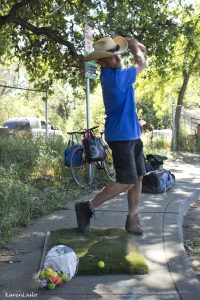
Lambach was a union iron worker before he moved to Paradise to help brother Andy, a lawsuit plaintiff, take care of their parents. Steve Lambach would like to go back to school, try landscape maintenance, something that would give him a way to “make things look nice.”
Steve Lambach says he can understand why property owners might complain about encampments where there’s no easy way to dispose of trash. “I see both sides of it,” Lambach says, “but back at the ranch we’re human beings, and where are we supposed to go? You practically have to be vice president of the United States to live anywhere.”
“It seems like we’re becoming a thorn in the side of America,” Lambach said of the unhoused, “and I don’t like that feeling.”

On this Sunday, members of churches and other groups have come to the encampment to help residents pick up and haul away trash. Charles Withuhn from North State Shelter Team has loaded a trailer, for the fifth time, with trash to haul away.
Withuhn is raising money for a mobile shower unit, and given a willing listener, talks about the variety of approaches needed to get people to safety. Withuhn says a homeless woman told him about being raped one night when she arrived a few minutes too late to get into the Torres Shelter.
“We’re going to need tiny homes, campgrounds, emergency cabins,” Withuhn says. “There is a variety of people and we need a variety of ways to get them into shelters.”
Brown and Huber are calling on the City Council to re-consider a sanctioned campground as a first step in facing the crisis; earlier this month the conservative majority dismissed the idea. “The cost of enforcement is far and above what it would cost to support sheltering,” Brown told ChicoSol.
“We’re not going to solve homelessness, we’re going to manage it” — Bob Crowe
“The solution is ultimately affordable housing,” she added. But until that problem is addressed, she said the city should create “access points to get support to people.”
“As a social worker, I know that meeting people where they’re at is the best approach.”
Chicoan Bob Crowe, who has arrived with a Unitarian Church group and is advocating the Built for Zero approach, addresses the argument that a little city like Chico can’t solve homelessness.
“We’re not going to solve homelessness,” Crowe said, “we’re going to manage it.”
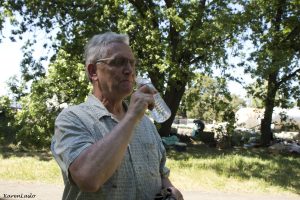
Crowe says the vitriol, the suggestion that all homeless are criminals, “breaks my heart” and feels like something new and ugly in a town that he has called home for decades. “Part of the social fabric has a big tear in it,” Crowe says, “and this is the consequence in a very white town that’s still very conservative.”
In some cases, Crowe says, homelessness is about a “human being standing there who’s really, really broken. We have to collectively come together.”
Leslie Layton is editor of ChicoSol and a freelance journalist.

Congratulations on an excellent, comprehensive article. I am always stunned at the trash discussion when it is clear that the city refuses to set up adequate trash bins (and porta potties.) On my nice street several neighbors routinely fill their garbage/recycling cans to the brim and beyond. And WE have shelter! What on earth are the unsheltered supposed to do with their belongings/trash. The gratuitous cruelty of this council and their fans is stunning.
I agree with Silona. If housed people didn’t have trash pickup for just 2 weeks their site would look the same – or worse.
As a citizen of Redding and a homeless advocate, I am constantly amazed at the audacity of the “housed” population’s ignorance of the real problem of homelessness and that is a lack of affordable housing. Many people are on SSI or some other type of “entitlement” program and have limited funds, however, housing, especially here in Redding, just isn’t available. If communities want to solve homelessness…they will have to, as Bob Crowe mentioned, control it. If communities are interested in picking out the criminals from the legit homeless, campgrounds managed by the homeless, or tiny homes, or a variety of other situations, preferably with smaller groups, is the only way to go. People deserve to be treated with dignity and respect, no matter their situation. Love is the only way to demonstrate caring for people, who through no fault of their own, find themselves in a homeless situation. It is difficult to navigate finding food, water, a place to sleep, a place to get and keep clean, and just having a place to simply be. People need to be more sympathetic and quit acting as if they are aliens. We’re all in a state of poverty, and the poverty of brotherly love is at its height. Just care people.
I’m 56 . I live in my Cadillac srx. Nice car lol. Chico has ran me off from every place I try to park..I even paid the fee at a state park for the day to get shade as I have ccad and chf..my heart pumps below 40 % . . Their new answer is a concentration camp on a dirt field 30.in walk to the edge of town by the airport.. big fences..armed guards..no shade ..no cooking and 3 honey pots for up to 500 people to pee n poop in..108% out side..really ..idiots.
I was/am/identify with being homeless and I always have a gripe as to how SOME people act towards me or others but since there are only pro-homeless comments I figure I might play devil’s advocate. I knew all this heat was coming, when the ordinance or whatever it is called, because of the pandemic, protected camping anywhere people took that good faith gesture and spat at it, set up tents everywhere in front of businesses in the middle of streets, in parks and people’s front yards… Inappropriate behavior in inappropriate places coupled with the complete lack of respect for apparently anything. I almost wanted to try and push them out too, but I could just shake my head and go hide in my batcave. If I was a resident and had to walk by one of these areas with my kid, every day? It is understandable. In good faith we were handed the rope to hang ourselves and we did just that. Sadly if it had been different it could have built bridges between the two communities.
Check inside yourself. What exactly offends you about destitute, largely unwashed people in front of your eyes? Do you blame them for their poverty or or Washington DC’s 1980 commitment to ‘neoliberalism’ – letting the “unfettered marketplace economy” (anything for a buck) solve the nation’s problems? Housin. as an essential to the American Dream, transformed into a Wall Street “commodity”. Since then, 50 trillion dollars traveled up from the middle class to the already wealthy 1% (Oxfam-USA) with huge help from Wall Street’s speculation in the housing industry.
Do you think big investors care about homes for people in the lower incomes? Do you think big investors care about families of carpenters, plumbers, electricians, etc. who lost jobs when Washington DC quit investing in low income housing (a leading factor in today’s homelessness)?